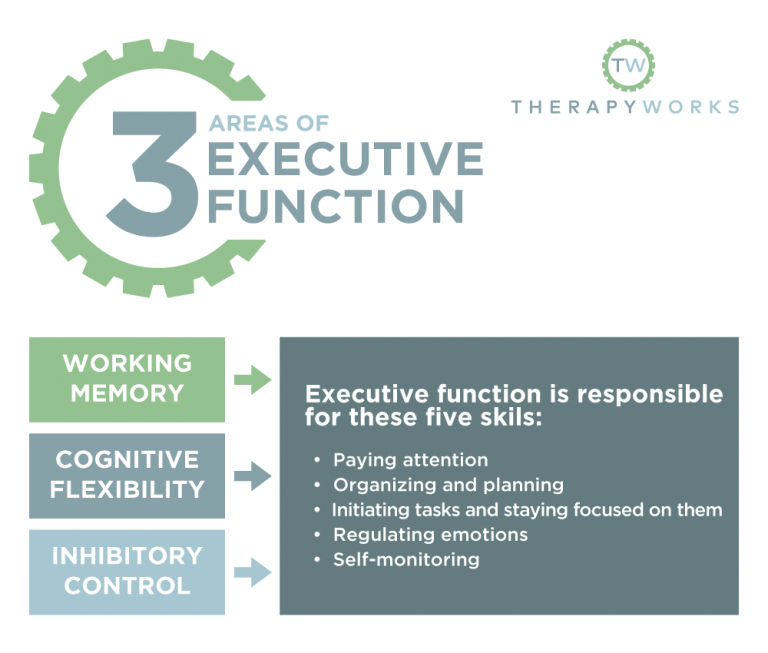What is executive function?
Executive functions are a set of cognitive skills that are important in learning. They are housed in the frontal lobe of the brain, sometimes known as the brain’s ‘action center.’
We use executive function to manage our thoughts, emotions, and attention span. With it, we control our behaviors and choose to perform actions that meet the desires, aims, and goals in our minds.
Executive function, in short, is how we transform thoughts into actions. It’s how we get stuff done.
Executive function skills are developed all throughout life but emerge rapidly during the preschool years. Strong executive function skills are cultivated early in life and help us in every aspect of living and learning.
There are three main areas of executive function: working memory, cognitive flexibility, and inhibitory control.

Working Memory
We use working memory to accomplish specific, short-term tasks. Information is retained in working memory long enough to complete the task at hand but not long enough to be ‘stored’ as learned information. Hence, working memory involves the short-term storage and manipulation of information.
Working memory is sort of like a piece of scrap paper where we scribble down someone’s phone number. Once the phone call is done, we crumple up the paper, throw it away, and never think about the number again.
Working memory is not quite the same as short-term repetition. If you heard a series of 6 digits and were then asked to repeat them back immediately, you would not need any working memory.
However, if you were instead asked to repeat those 6 digits backwards, or to remember them for an entire hour, that would involve working memory. In these cases, you would need to manipulate information in your brain and devise a strategy to remember the digits for more than just a few seconds.
Cognitive Flexibility
Cognitive flexibility includes two primary skills: (1) our ability to solve problems in multiple different ways; (2) our ability to transition between thoughts, i.e. to think about one thing and then think about another thing.
Without these skills, we cannot problem-solve. Most problems, after all, can only be solved in one or two specific ways. Someone without cognitive flexibility would become stuck on one thought or one solution and be unable to consider alternative options.
But with these skills, we can look at an issue from multiple different angles and consider different courses of action to solve the problem.
Inhibitory Control
Inhibitory control refers to our ability to tune out distractions and focus on the task at hand. It also allows us to control our immediate impulses and choose behaviors that are most appropriate for the moment. Inhibitory control is also sometimes called response inhibition.
Children with Attention Deficit Hyperactivity Disorder (ADHD) often have difficulty with inhibitory control.

Working memory, cognitive flexibility, and inhibitory control are all essential parts of executive function. When they all work together, they allow us to:
- Pay attention
- Organize and plan effectively
- Initiate and stay focused on tasks
- Regulate our emotions
- Keep track of what we are doing
How to Know When to Seek Support: Executive Function Therapy
Difficulty with executive function can impact every aspect of a child’s life. If you think that your child may be struggling with executive function, seek professional guidance. Early intervention for executive function challenges is often highly effective.
Here are some of the reasons to consider consulting with a therapist specializing in executive function. Your child may:
- Answer questions “off-topic”
- Have difficulty focusing
- Have trouble following multi-step directions
- Have difficulty with short term memory
- Become easily distracted
- Experience challenges with self-regulation or self-management
- Have difficulty initiating tasks
If you’d like to discuss your concerns, please don’t hesitate to reach out to us. TherapyWorks has many therapists that specialize in improving executive functioning skills. We would be happy to discuss your concerns and make recommendations.








